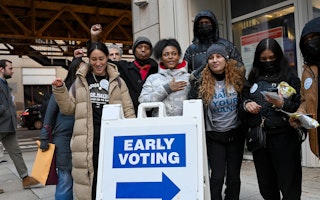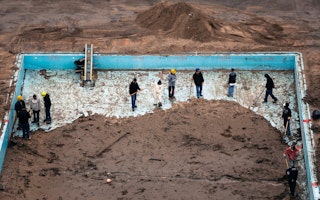Make Voting Fair and Easy
By Muzna Ansari
If this year’s elections have proved anything, it is that our nation’s systems remain antiquated, especially in comparison with other democratic nations. The confused and insufficient number of poll workers, incredibly long lines, and broken scanning machines shocked many voters. These problems were compounded by state budget cuts, which led to further downgrades of already outdated systems and structures, including the elimination of polling locations and the consolidation of others. Voting, an act central to our nation's democracy, should be fair, easy, and seamless—it should not be a burden on our nation’s citizens.
Here at the Open Society Foundations, we have and continue to care deeply about making voting easier and more accessible—and agree with President Obama that we must fix our nation’s systems. A large part of this involves modernizing registration systems and making registration more accessible to low-income populations. Although states maintain computerized voter rolls, citizens fall off the rolls when there are errors, or when they move or change their address. We have supported the modernization of these systems, which for example, means citizens can register or update their registration online or at the polls. So far, at least 21 states have automated their voter registration systems to some extent. Simultaneously, we have supported implementation of the National Voter Registration Act, (commonly known as “the Motor Voter Law”), ensuring that voter registration services are provided at public agencies. In Mississippi for example, the work of grantee partner Demos led to a 2,500 percent increase in the number of voter registrations in the state per month.
In addition to continuing work on enhancing our nation’s systems and supporting efforts to protect voters from intimidation and restrictive policies, going into 2013 we will support affirmative reforms to make voting not only easier, but more accessible. Two examples of our planned work include Same Day (or Election Day) Registration and mitigating restrictive voter identification reforms. The first would create a seamless connection between registration and voting, making the process especially easier for first-time voters. The second would reform restrictive photo identification laws so they are more expansive and include different types of identification, giving voters greater flexibility.
Voting is a central tenet of our nation and while we admire those who waited hours in line to fulfill their civic duty, this should and cannot be the norm. We know that making the process of casting a ballot one that is and more accessible will be difficult work but because it is a quintessential part of an open society, we are eager to face the challenges that lay ahead of us.
Until August 2014, Muzna Ansari was a program associate at the Democracy Fund of the Open Society Foundations.


